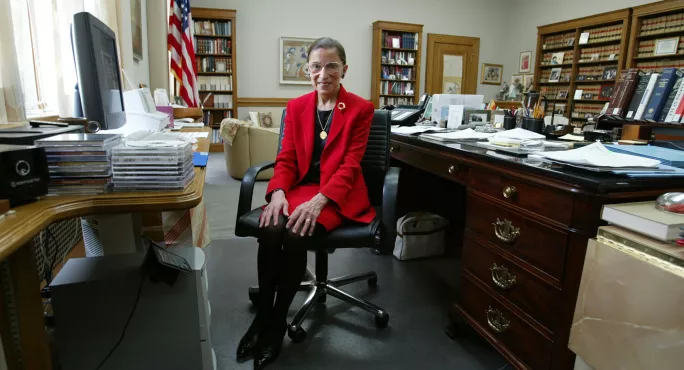
- Home
- Why British pupils must learn about Ruth Bader Ginsburg
Why British pupils must learn about Ruth Bader Ginsburg

The name of US Supreme Court justice Ruth Bader Ginsburg has been difficult to miss since the news of her death on Friday, at the age of 87.
Her death has political consequences, with Ginsburg now likely to be replaced on the Supreme Court by a Republican judge nominated by Donald Trump. This will increase the conservative majority on the Supreme Court.
Importantly, though, Ginsburg is not only newsworthy for the political turmoil left in the wake of her death, but also for her legacy.
She is someone our students should learn about in her own right: an indomitable force who led the fight for gender equality in the American justice system, and a trailblazing role model for female empowerment, both within and beyond the courtroom.
We can use Ginsburg in schools as an example of the personal qualities and values that we would all - students and teachers alike - do well to emulate.
A model of persistence
Ginsburg was a model of persistence, showing that in order to get the results you want, you need to try and try again…and again, and again.
Before she reached the Supreme Court, she helped overturn gender bias in the law by carefully fighting cases, one at a time, each of which focused on a different piece of sexist legislation. She ultimately persuaded the - then all-male - members of the Supreme Court to recognise legal discrimination on the basis of sex by working in small stages, winning cases one by one.
Ginsburg, therefore, is a fantastic role model, because she demonstrated that success comes with hard work, patience and, above all, persistence.
Making it to the top without compromising your principles
By working her way to the Supreme Court, Ginsburg showed us that it’s possible to get to the very top without compromising your principles.
In fact, her goals throughout her career ultimately revolved around society, rather than individualism. She once said that the aim of a meaningful life should be “to make life a little better for people less fortunate than you...One lives not just for oneself, but for one’s community.”
She recognised the power of individuals to make a difference, and believed strongly in inclusivity and diversity, telling new US citizens that ”we are a nation made strong by people like you”.
Above all, by striving for gender equality throughout her career, she demonstrated a fundamental and unwavering commitment to social justice, which can provide a shining example to us all.
The value of criticism and questioning
Ginsberg fought for what she believed was right. She wasn’t afraid to be a dissenting voice - in fact, she valued her right to disagree and to question the viewpoint of the majority.
When speaking about her famously frequent dissents (a term for a written disagreement with the majority opinion of the court), she explained: “The dissenter’s hope…[is] that they are writing not for today, but for tomorrow.” In other words, she believed strongly in the power of disagreeing with the majority viewpoint to incite change over the long term.
She had strong principles that she would in no circumstances compromise on. The legacy of Ginsburg, therefore, can provide a way into discussing the value and importance of strong principles with our students, and reflecting on the times it is right to speak up and to disagree.
Courage in the face of adversity
Not only did Ginsburg fight for equality for women under the law, but she also repeatedly overcame sex discrimination early in her own legal career.
As an outstanding student who graduated first in her class, she was initially refused a role as a law clerk because of her sex. And, as one of the only female students in Harvard Law School, she was criticised by male staff for taking a place on the course that could have gone to a man.
In her personal life, she also faced adversity: Ginsburg also grew up in a poor household, and her mother died on the day before her high school graduation. As a young woman, she had to support her husband through testicular cancer, while also caring for her infant daughter and finishing her law degree.
At every stage, Ginsburg persisted in the pursuit of her goals. She is, therefore, a staggering example of courage in the face of adversity.
Quiet determination
In her personal life, Ginsburg was known as reserved and shy, admitting to nerves before her court appearances, even if these feelings were never outwardly apparent.
When we look around at our world leaders, it sometimes appears that the people who shout the loudest reach the top. Or, in the age of Instagram and Photoshop, that appearance is everything, and that self-promotion is the key to success.
So what an inspiration it is for our young people to look at the life of a woman who did it differently: a woman who showed, throughout her life, a quiet determination to do what was right. That’s the kind of role model we all need.
Megan Mansworth is an English teacher and PhD student. She tweets @meganmansworth
Register with Tes and you can read five free articles every month, plus you'll have access to our range of award-winning newsletters.
Keep reading for just £4.90 per month
You've reached your limit of free articles this month. Subscribe for £4.90 per month for three months and get:
- Unlimited access to all Tes magazine content
- Exclusive subscriber-only stories
- Award-winning email newsletters
You've reached your limit of free articles this month. Subscribe for £4.90 per month for three months and get:
- Unlimited access to all Tes magazine content
- Exclusive subscriber-only stories
- Award-winning email newsletters



